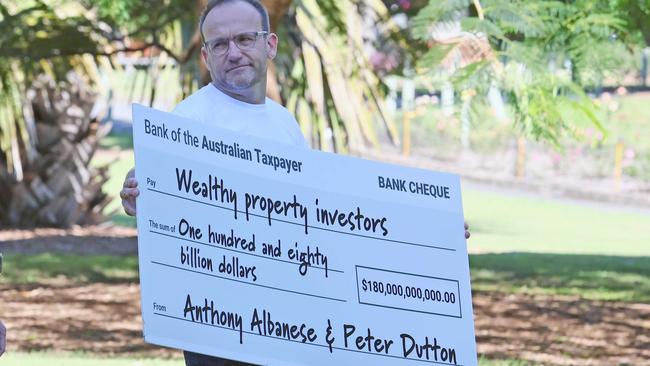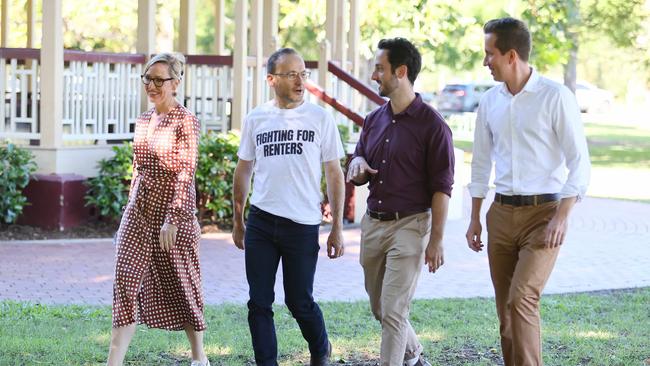Dutton accuses Albanese of negative gearing changes; Greens blast handouts to investors
Peter Dutton has claimed Prime Minister Anthony Albanese has a plan to bring in place negative gearing changes as Greens leader Adam Bandt slammed tax handouts that’ll leave renters worse off.
Federal Election
Don't miss out on the headlines from Federal Election. Followed categories will be added to My News.
Opposition Leader Peter Dutton has claimed Prime Minister Anthony Albanese has a plan to bring in place negative gearing changes if Labor is re-elected—despite the government repeatedly pointing out this isn’t the case.
It comes after Mr Albanese said it was a “normal process” for federal Treasury to model potential impacts of negative gearing and capital gains tax changes.
Treasurer Jim Chalmers has said the modelling found negative gearing changes would not provide the needed jolt in housing supply the nation needed.
“If you own a rental property and setting up to buy a property so you can maybe have a bit of extra income in retirement, if you’ve got a rental property and think you may leave that to your kids one day, all that is at risk under the Albanese government,” Mr Dutton said.
“At least Bill Shorten was honest with the Australian people in relation to negative gearing, the Labor Party is always harboured a desire to abolish negative gearing and their partners in crime the Greens are open about it as well.”


His comments come after Greens leader Adam Bandt has criticised the tax handouts that are set to benefit Australia’s wealthiest investors claiming it will leave renters and first home buyers worse off.
In the second leaders’ debate, both were asked by debate host David Speers why both leaders were not willing to touch the generous tax discounts offered to property investors, negative gearing and capital gains tax.
Mr Albanese said Labor wouldn’t touch the two issues as “the experts say that what that would potentially do is diminish (housing) supply, not increase it”.
Experts have said loss of stock could be more than offset by spending a portion of the money that would be reclaimed by winding back those tax concessions.
Mr Dutton also took aim at Labor for having Treasury model changes to negative gearing and capital gains tax concessions during the last term.
“If we stop negative gearing, we will drive up the cost of rents. Rents are already up by 18 per cent under this Government. So, I want to make sure that we’ve got an investment class, which is an asset class, which is able to be invested in,” Mr Dutton said.

“The Greens, who likely could form a minority government with the Prime Minister if he’s successful at this election, they have as a stated policy that they want to abolish negative gearing.”
Mr Bandt, joined by Senator Larissa Waters, Greens MP Max Chandler-Mather and Federal Member for Brisbane Stephan Bates on Thursday to respond to the bipartisan support for tax concessions.
Mr Bandt csaid new analysis released by the Greens showed the cost of negative gearing and capital gains tax discounts will skyrocket to $180.5bn over the next 10 years.
“The leaders’ debate saw Anthony Albanese and Peter Dutton furiously agreeing on $180 billion in handouts for property investors that turbocharge house prices and deny millions of renters the chance to buy their first home,” he said.

“The new data that we are releasing today shows that under Labor and Liberal the housing crisis will get worse because they are giving $180 billion in handouts to wealthy property investors that are denying millions of renters the chance to buy their own home.”
What is negative gearing?
Negative gearing allows investors to borrow money to invest with the income from the investment being less than what the investment costs you in interest and other expenses like maintenance. It means that you're making a loss on your investment and off-setting this against your taxable income.
While the Greens like to paint investors as wealthy, there are many middle income people investing in homes, which Labor and the Coalition argues increases supply which in the long term means reduced impacts on rent. A lack of housing supply is generally a bigger cause of rent rises.
How does capital gains tax work?
According to the Australia Institute, capital gains tax is paid when you buy an asset and then later sell it for a profit, the profit you make is taxed as income. The capital gains tax discount means that if you buy an asset (often a house), hold it for 12 months and then sell it, you only pay tax on half the profit you made. For example, if you bought a property for $400,000 and a year later sold it for $500,000, you have made a capital gain of $100,000. The discount means you only have to pay tax on $50,000.
More Coverage
Originally published as Dutton accuses Albanese of negative gearing changes; Greens blast handouts to investors




